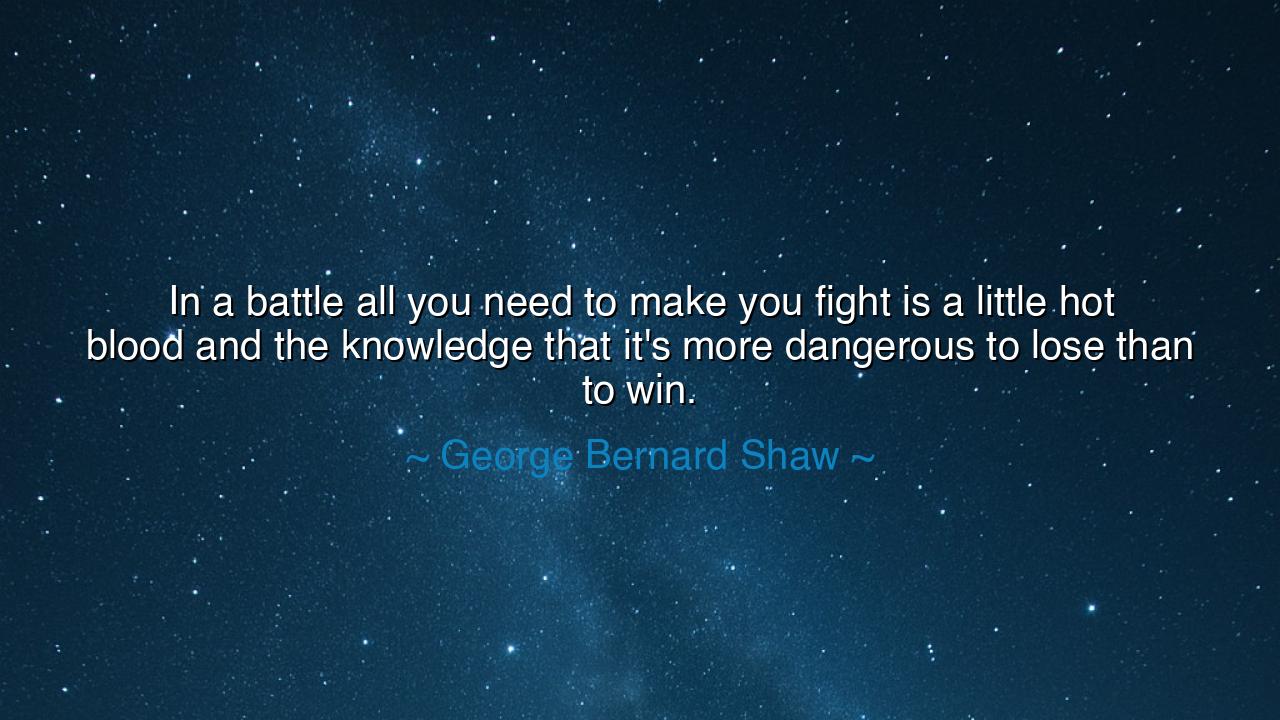
In a battle all you need to make you fight is a little hot blood
In a battle all you need to make you fight is a little hot blood and the knowledge that it's more dangerous to lose than to win.






“In a battle all you need to make you fight is a little hot blood and the knowledge that it’s more dangerous to lose than to win.” – George Bernard Shaw
In this fiery declaration, George Bernard Shaw, the playwright and philosopher of paradox, lays bare a truth that burns at the core of human struggle. His words are not merely about the clash of armies—they are about the battles of life itself: the conflicts of duty, survival, and conviction that test the mettle of every soul. Shaw, ever the keen observer of human nature, understood that courage is not born of perfection, but of passion and necessity. When the heart is stirred by “a little hot blood”—that primal spark of will—and when the mind perceives that defeat would cost more than victory, a person becomes unstoppable.
The meaning of this quote lies in the raw psychology of conflict. Shaw reminds us that one does not need to be fearless to fight, only aware that surrender carries the greater peril. “Hot blood” represents the flame of emotion—the righteous anger, love, or resolve that drives a person to act beyond fear. But passion alone is not enough. The second half of his insight—the “knowledge that it’s more dangerous to lose than to win”—is the cold wisdom that steadies the hand. Together, emotion and reason forge the spirit of the warrior: heart and mind united in purpose. In battle, whether literal or metaphorical, victory favors not the strongest, but the one who fights with clarity and conviction.
The origin of Shaw’s perspective springs from a lifetime spent studying the contradictions of human behavior. Though not a soldier himself, he lived through an age of revolutions and wars, and he saw how ordinary men, when pressed by circumstance, could summon extraordinary courage. He understood that in moments of crisis, people act not out of pure heroism, but because they see no alternative but to stand and fight. This was not cynicism—it was realism. Shaw believed that when humanity recognizes the necessity of struggle, it transcends cowardice and discovers its truest strength.
History bears witness to this truth. Consider the soldiers of Thermopylae, those three hundred Spartans who stood against the Persian tide. They did not fight because they expected to live—they fought because they knew that losing would mean the death of their homeland, their families, and their freedom. Their courage was not born of blind rage, but of the unshakable awareness that defeat was unthinkable. Their blood ran hot with passion, but their minds were clear as iron. And in their sacrifice, they became immortal—not because they won, but because they fought as if victory was their only possible fate.
In another age, this same truth was reborn in a quieter form. Winston Churchill, during the darkest hours of World War II, roused a weary nation not with promises of ease, but with the grim understanding that survival itself was at stake. “We shall never surrender,” he thundered, not to ignite blind fury, but to awaken that ancient instinct Shaw described: the fusion of courage and necessity. When a people realize that the cost of giving up is greater than the cost of continuing, they find within themselves a power that astonishes even them. This is the wisdom of Shaw’s words—the fire that keeps civilizations alive when the night grows long.
And yet, Shaw’s quote speaks not only to the battlefield of nations, but to the inner battles that every human must face. Each of us, at some point, must fight an unseen war—against despair, against fear, against the weight of failure. When that moment comes, “a little hot blood”—the courage to act—and the awareness that surrender would lead to ruin, can carry us through. It is not perfection that wins the day, but persistence; not serenity, but the refusal to yield. The one who knows that losing their self-respect, their integrity, or their dream is the greater danger will fight harder than any who simply seek victory for pride alone.
The lesson of Shaw’s insight is both humbling and empowering: to fight well, you must feel deeply and think clearly. Let your passion ignite your purpose, but let wisdom guide your hand. In every struggle—whether it is for justice, love, freedom, or the soul itself—remember that defeat is not merely the absence of victory; it is the loss of what makes you whole. When you understand that truth, courage ceases to be an act of will and becomes an act of nature.
Therefore, in the spirit of George Bernard Shaw, let every battle you face—great or small—be met with both the fire of the heart and the clarity of the mind. Do not fear struggle; it is the forge of strength. And when the moment comes when you must stand, stand fiercely, knowing that to yield would cost you far more than to fight. For in that union of passion and purpose lies the secret of every triumph humanity has ever known.






AAdministratorAdministrator
Welcome, honored guests. Please leave a comment, we will respond soon